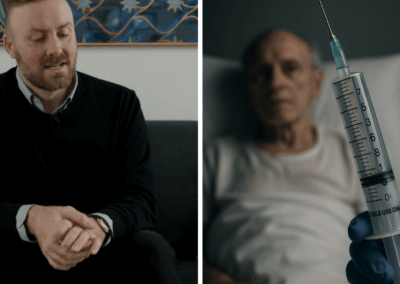A quadriplegic Canadian woman is considering euthanasia because she says it is more readily available than state disability support, even though she does not want to die.
Rose Finlay is a 33-year-old quadriplegic mother of two children who have disabilities. She has released a video on social media in which she explains that she has applied for Canada’s euthanasia and assisted suicide program and why she has chosen it.
She says “There is a huge and detrimental discrepancy that exists in the supports that are available to disabled Ontarians. The fact that it takes 6 to 8 months to receive disability support and only 91 days to receive medical assistance in dying based on the fact that I have a disability and a decreased quality of life, but my quality of life has decreased based on the level of support that I receive”.
Finlay explains that some people have accused her of leaving her children behind but she says that her continued and worsening health issues mean that she is “not being very useful to my kids”.
She told Global News that “My life as it is, without support as a quadriplegic is far more deadly than me even exploring the MAID process”.
Finlay has had her spinal injury since she was 17 but she was able to support herself through her disability advocacy service, Inclusive Solutions, until recently when her frequent illnesses left her unable to work.
In March this year, Finlay decided to explore euthanasia and assisted suicide even though “it’s not what I want”.
“But if I don’t receive the support that I need, the outcome is the same. If I get to a point where I am really sick and basically terminally ill anyways, I would like to have other options” she added.
The mother of two went on to say that even if she received support from the Ontario Disability Support Program, she would be living in “forced poverty” because the payout is too little to cover living expenses.
To assist with her needs, Finlay has set up a fundraiser, in which she says the Canadian government has “created the perfect storm for disabled people here in Ontario. Starve them, cut them off from participating in society and then offer them death.”
Euthanasia due to poverty
A recent Canadian attitudes survey revealed that over a quarter of those surveyed thought that ‘poverty’ and ‘homelessness’ should be made legal reasons for allowing euthanasia in Canada.
27% of those who took the survey said they would support “poverty” being made a reason for euthanasia, while 62% remain opposed to this. Shockingly, 41% of 18-34-year-olds were supportive of poverty being a reason for euthanasia.
Additionally, a New Atlantis investigation found evidence of a number of people who sought to end their lives for reasons related to poverty. One patient, Rosina Kamis, suffered from leukaemia and other health problems and was euthanised in 2021 on this basis. However, in a letter apparently to her lawyer, she admitted that this was just a pretence and that the real reason for ending her life by euthanasia was due to the mental anguish she was experiencing.
She was facing eviction from her home, was crowdfunding to pay for food, and was concerned she would “suffer alone”.
She wrote “Please keep all this secret while I am still alive because… the suffering I experience is mental suffering, not physical”.
Right To Life UK spokesperson Catherine Robinson said “The dire situation in Canada should serve as a lesson to the UK and other countries considering making euthanasia and assisted suicide legal.”












